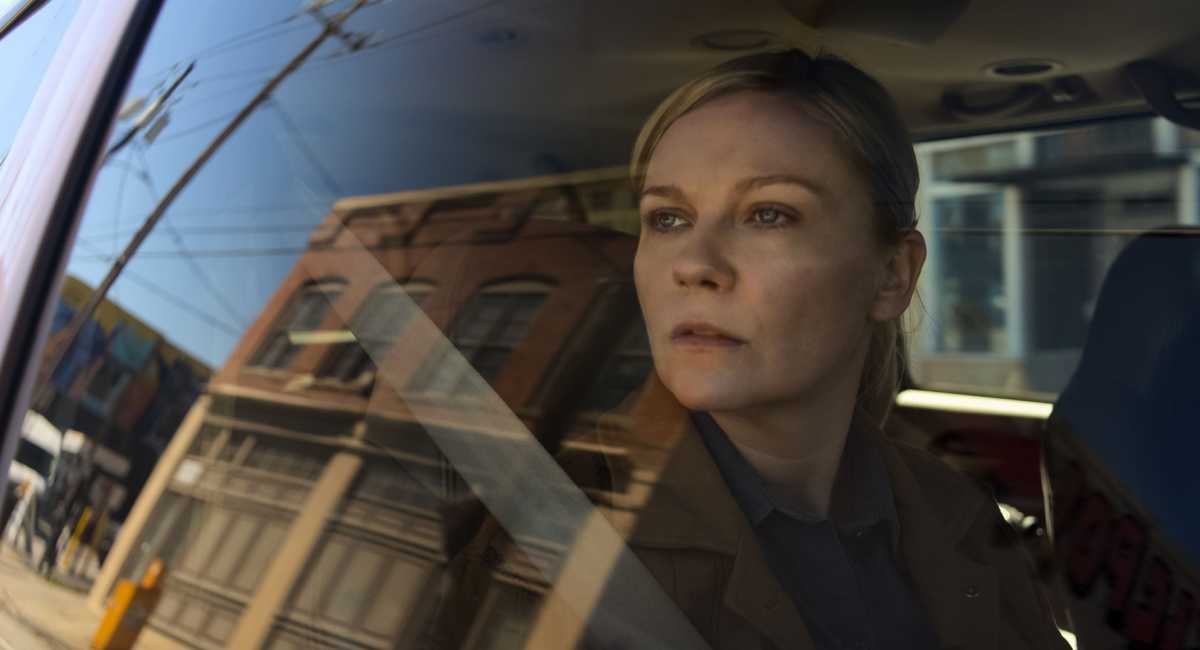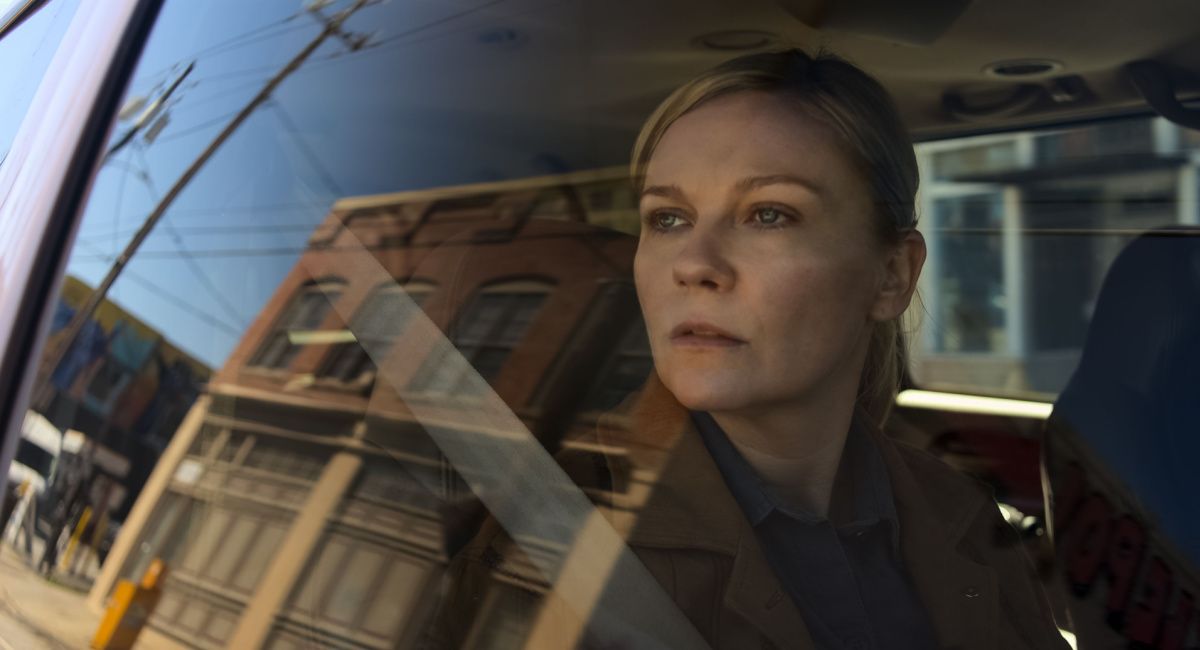
Kirsten Dunst in ‘Civil War.’ Photo: A24.
Opening in theaters Friday (April 12) is ‘Civil War,’ starring Kirsten Dunst, Wagner Moura, Stephen McKinley Henderson, Cailee Spaeny, Nick Offerman, and Jesse Plemons.
Related Article: Cailee Spaeny and Jacob Elordi Talk director Sofia Coppola’s ‘Priscilla’
Initial Thoughts
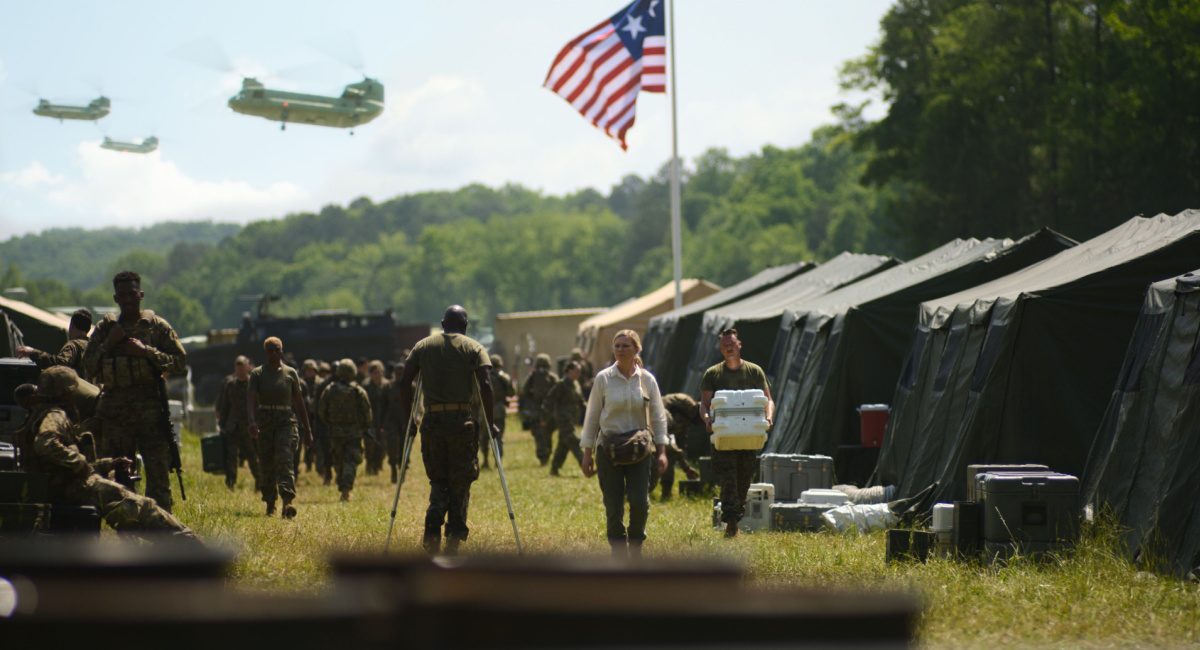
Kirsten Dunst in ‘Civil War.’ Photo: A24.
‘Civil War,’ written and directed by Alex Garland (‘Ex Machina,’ ‘Annihilation’) is a deeply upsetting and frightening film – and we mean that in the best way possible. Set in an America that looks and feels very much like the one we’re in now, this brilliantly made film presents a harrowing vision of a nation tearing itself apart – as well as the story of a small group of journalists determined to witness history no matter what.
Garland’s film is so unnerving because he almost underplays the conflict in a way – since the U.S. is so damn large, there are moments when he lulls you into thinking that vast swaths of the country are untouched by the disaster unfolding in its midst. But make no mistake, there’s a pervasive sense of dread throughout ‘Civil War,’ with terror and chaos lurking around every corner. The cumulative effect is devastating, and regardless of one’s politics, this is a movie that everyone should see – if only because we seem to be skating closer to the edge of the abyss that Garland and his cast so memorably portray.
Story and Direction
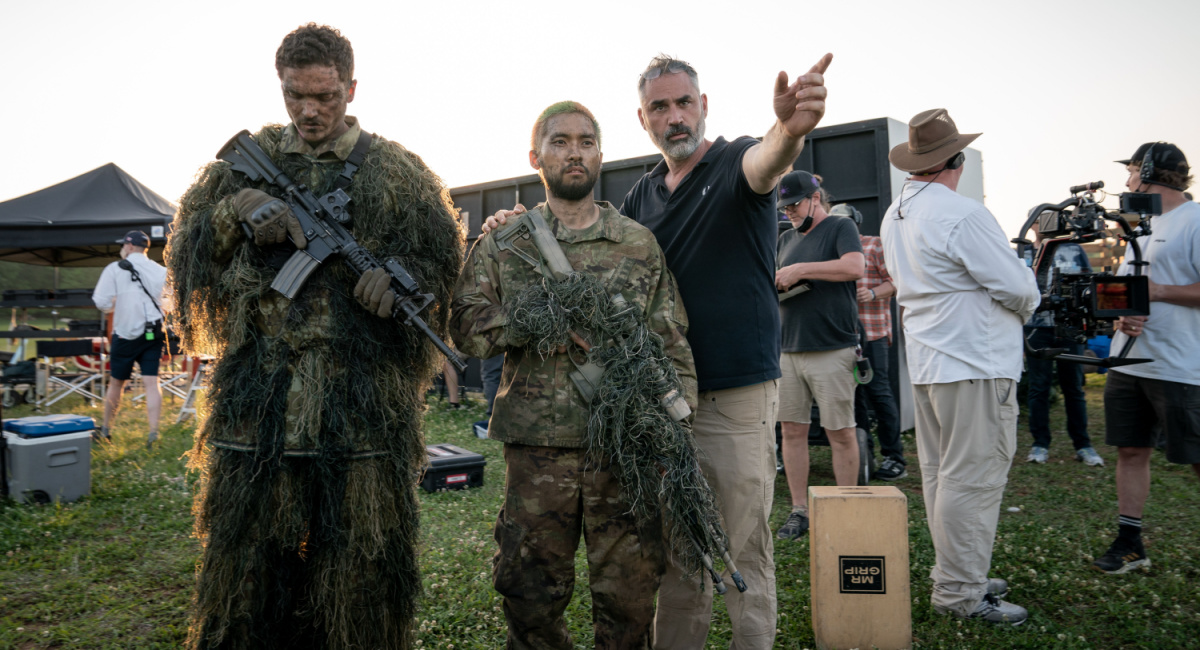
(Right) Director Alex Garland on the set of ‘Civil War.’ Photo: A24.
Sometime in the not-too-distant future, civil war has broken out in the United States. The reasons are left unsaid, as are the events that led to Texas and California forming their own union, the Western Forces, which plan a final assault on Washington D.C. to remove the President (Nick Offerman) from office. Another faction, the Florida Alliance, looms in the background. Either way, the events that got the country to this point are never explained, but it’s clear that the U.S. has turned into a geopolitical and humanitarian nightmare.
In the midst of all this, Alex Garland’s film focuses on a band of four reporters – the hard-bitten, callous photojournalist Lee (Kirsten Dunst), the cynical Joel (Wagner Moura), the world-weary Sammy (Stephen McKinley Henderson) and the novice photographer Jessie (Cailee Spaeny) — who set out together from New York to travel to where the Western Forces are amassing for their final push into the nation’s capital.
Lee recognizes that Jessie has talent and reluctantly takes her under her wing, warning the young woman that there are far worse horrors ahead if she pursues her calling and that she must present the truth of what she sees with an unblinking eye. In some ways, ‘Civil War’ is the parallel journey of these two women – Lee has hardened herself to what she sees through her lens but may finally be breaking down and letting herself feel what’s happening, while the untested, somewhat naïve Jessie goes through a trial by fire to make herself into the crusader for truth that she hopes to become.
‘Civil War’ is also about journalism itself – and the necessity of journalists to report and document what they see without bringing their own biases to the table. That means a lie is a lie, the truth is the truth (not “your truth” or “my truth”) and even the most righteous-minded can do something unspeakable. Lee, Joel, and company are there to chronicle what happens – and let historians and future leaders figure out what it means.
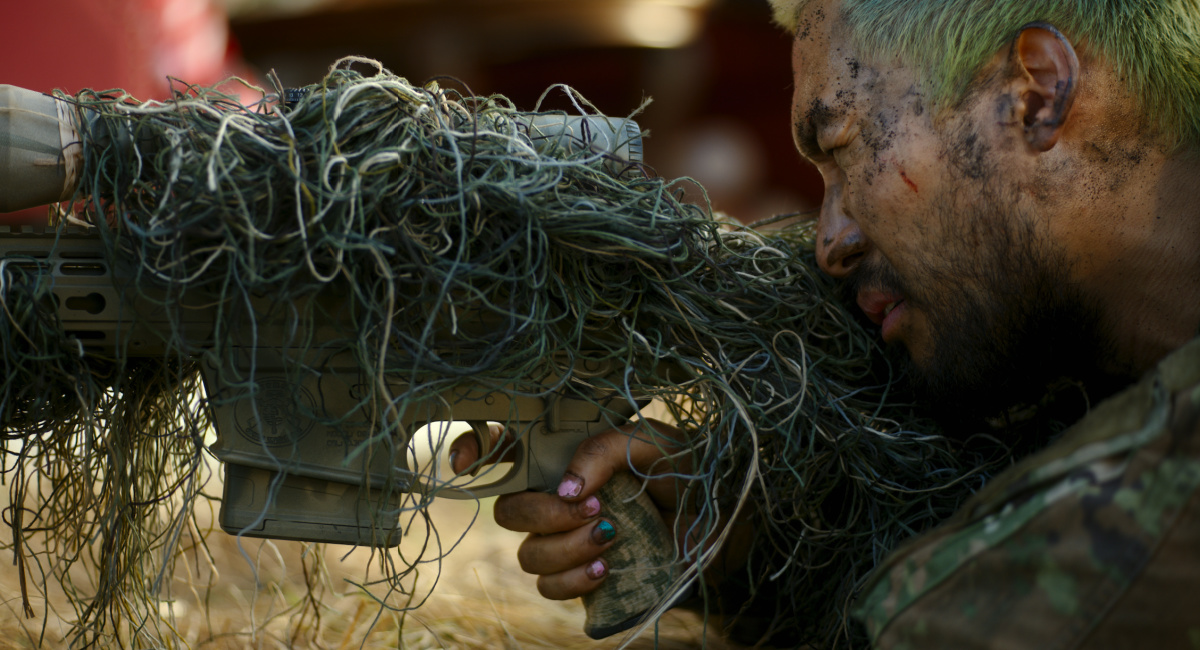
‘Civil War.’ Photo: A24.
But even they, of course, are only humans and flawed ones at that: at one point in the film, our four protagonists and a couple of other reporters they meet up with – who have all been a little cavalier up to this point — are given the brutal realization that all the press badges in the world will not protect them anymore, and that events are spinning out of control faster than they might have thought. This is brought home in one of the film’s most terrifying scenes, featuring an uncredited Jesse Plemons (which you’ve seen a bit of in the trailers).
The scene involving Plemons is the most unnerving in the film, yet it’s one of many that feature imagery straight out of a U.N. war zone: Garland and DP Rob Hardy expertly blend widescreen shots of the American countryside – parts of it still pristine – with more close-up, documentary-like footage of refugee camps, burning urban areas, and hand-to-hand combat. Tanks rumble through American streets as jet fighters scream overheard, anti-aircraft weapons firing at them from below. Even a quiet town tucked away somewhere in Pennsylvania, where it doesn’t seem like the war has touched anything, posts armed sentries on its rooftops. The America of ‘Civil War’ is both eerily recognizable and yet utterly, unspeakably warped.
In this and other ways, Garland channels another film about a violent conflict sinking into madness: ‘Apocalypse Now.’ At one point, our journalists come upon two soldiers who are pinned down by a sniper in a distant mansion. No one seems to know who’s the mansion or what side anyone is one. It’s directly reminiscent of the scene in Francis Ford Coppola’s Vietnam epic when Martin Sheen and his crew come upon a remote U.S. outpost that’s descended into chaos: “Who’s in charge here?” Sheen asks a dazed soldier. “Ain’t you?” the soldier replies.
Garland punctuates this accumulation of disturbing images with both an ominous, pulsing score by Geoff Barrow and Ben Salisbury, as well as jarringly delicate folk songs and somber pop numbers, bringing a wistful, overwhelmingly sad emotional undercurrent to the horrors unfolding onscreen.
The Cast
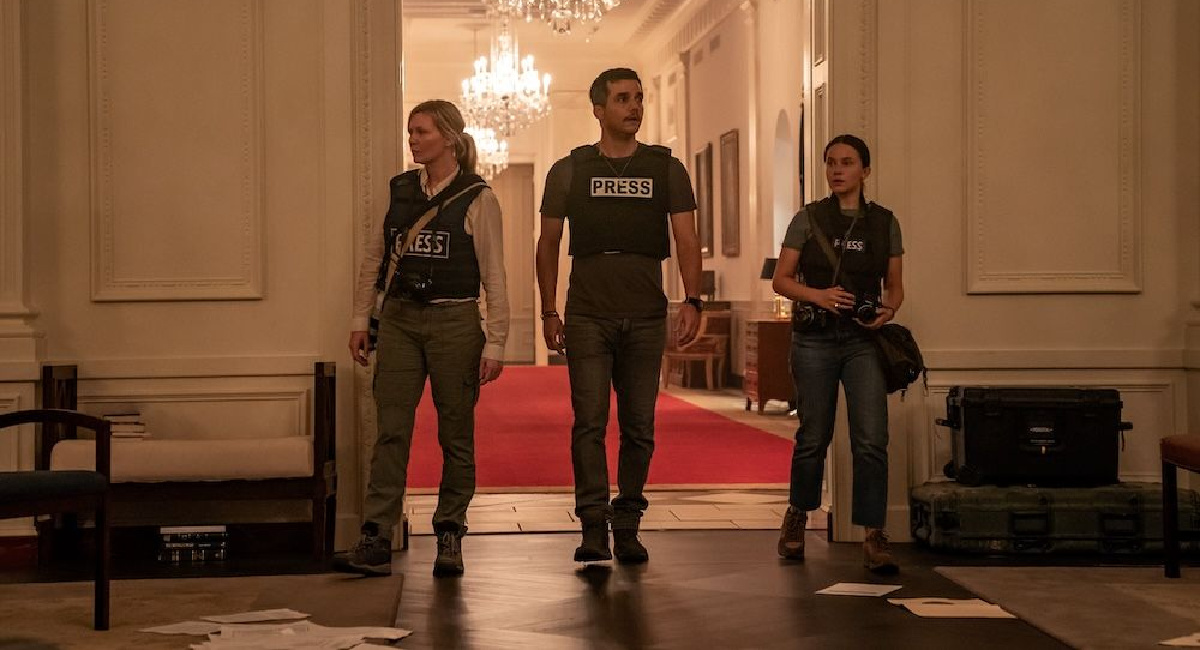
(L to R) Kirsten Dunst, Wagner Moura and Cailee Spaeny in ‘Civil War.’ Photo: A24.
Kirsten Dunst easily gives one of the finest performances of her career as Lee, the combat photographer who says at one point, “Every time I survived a war zone, I thought I was sending a warning home: don’t do this. But here we are.” Lee has seen it all and then some, and at the film’s outset, it almost seems as if nothing will either rattle her or get to her emotionally. But that changes once she meets Jessie, as she sees something of her younger self in the inexperienced photographer and wants to both nurture and protect that.
It’s a subtle, complex performance by Dunst, and it’s complemented by Wagner Moura’s charismatic turn as Joel. The Brazilian ‘Narcos’ star gives Joel an easy charm, a rakish demeanor, and a compassionate undertone, all of which is gradually chipped away as the film goes on. Like Dunst’s lee, Moura’s Joel undergoes a gradual transformation, reaching his goal of getting an interview with the President but perhaps not in the way he initially envisioned.
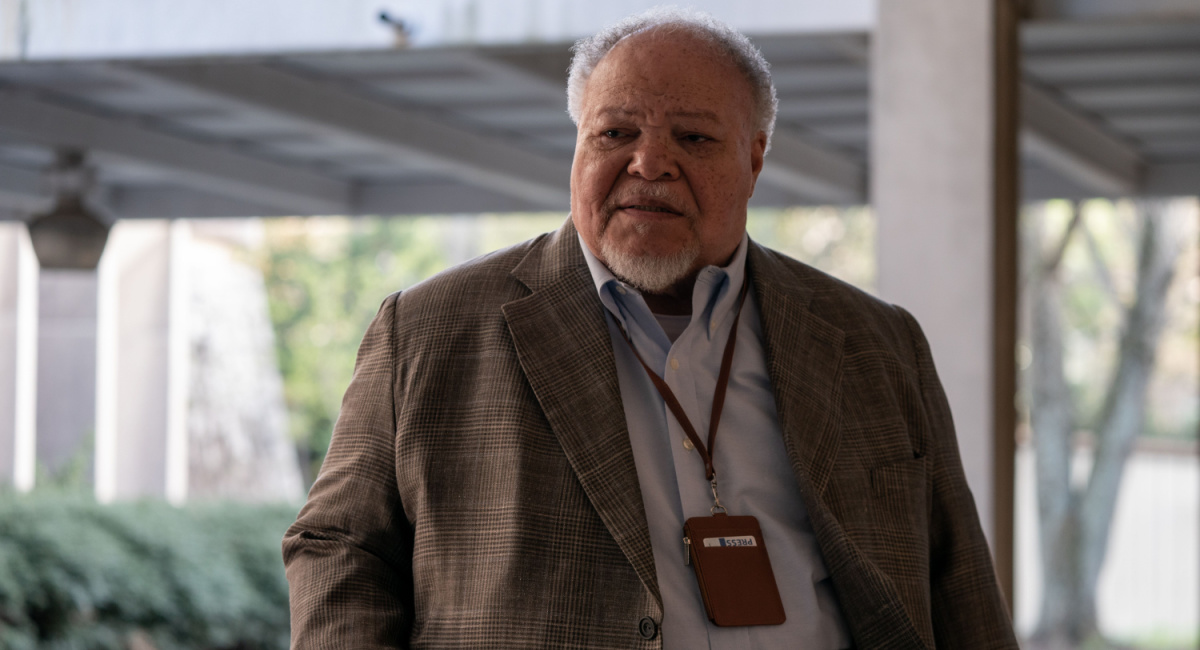
Stephen McKinley Henderson in ‘Civil War.’ Photo: A24.
Somewhere between both of them is Stephen McKinley Henderson’s Sammy, an older New York Times reporter who is at this point not physically up to the strenuous journey ahead but willing to keep going no matter what. One of our great character actors of the stage and screen (with indelible recent performances in films like ‘Fences’), Henderson effectively portrays Sammy’s world-weariness and cynicism, even as he remains alert and savvy to what’s happening around him. Compassionate as well, his sense of humanity is pushed to the brink by what he experiences on the road to D.C.
While we admire Cailee Spaeny’s work here (and in last year’s ‘Priscilla’), we’re not as effusive about her character’s narrative. Jessie is initially cheerful, headstrong, and somewhat naïve about the job she wants to do, and as the story goes on, she becomes more shell-shocked and terrified by what she experiences. But some of her decisions, as well as her rather abrupt latter turn into a fierce photo-warrior – throwing herself into danger to get the shot – feel somewhat rushed and contrived, making a character who should be more of an avatar for young audience members into a plot device.
Final Thoughts
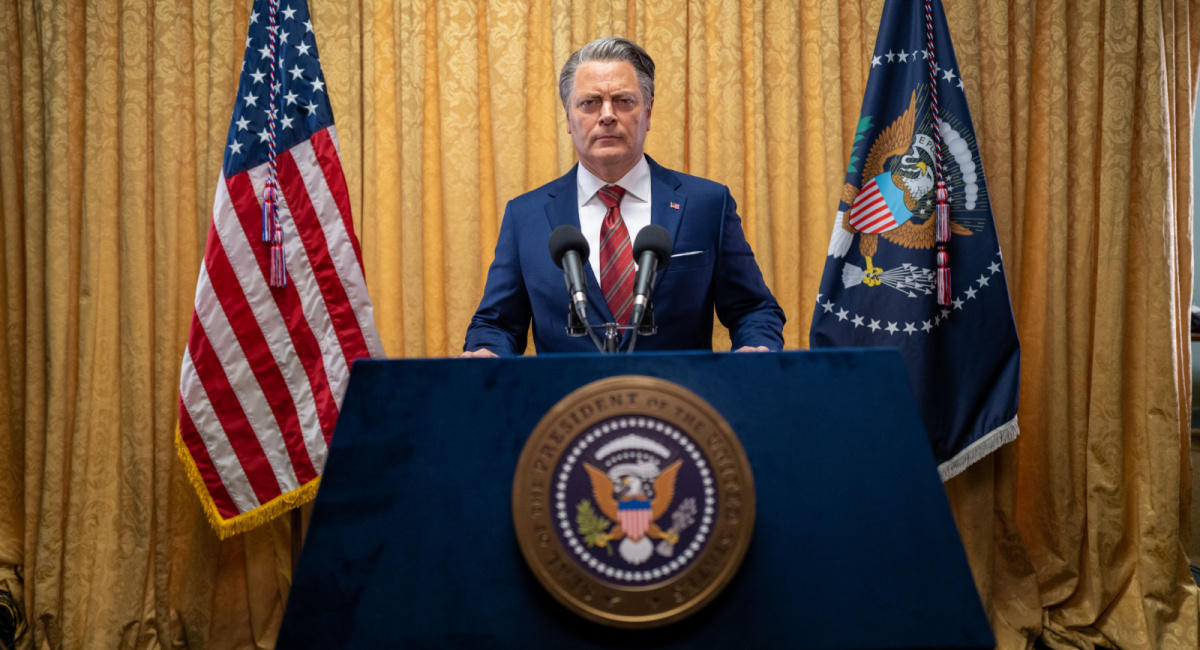
Nick Offerman in ‘Civil War.’ Photo: A24.
Moviegoers are going to bring their own politics into ‘Civil War’ and read it the way they want, which is part of what makes Alex Garland’s film so excellent. There has been some criticism online of Garland’s decision to keep the reasons for the war offscreen, as well as his choice to unite California and Texas – two states that nowadays couldn’t seem further apart politically – into a seemingly unlikely alliance. But to make Nick Offerman’s brief turn as the President into a take on Biden or Trump, and to make the film into a blue state-red state polemic, would not only instantly date it but create a more concrete polarization that would miss the point.
‘Civil War’ doesn’t detail how we got to this point; the film instead asks, “Okay, we’re here now. What are you going to do about it?” The fact that the film doesn’t offer a definitive resolution or simple answer is perhaps the most unsettling thing about it. With ‘Civil War,’ Alex Garland shows us one possible future in all its terrifying plausibility – what we do about it will either keep this film in the realm of speculative fiction or make it a prophetic document of a great nation disintegrating due to its own distrust, misinformation, and fear.
‘Civil War’ receives 9 out of 10 stars.
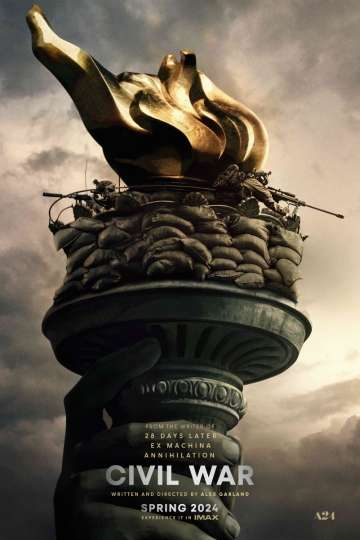
“Welcome to the frontline.”
78
1 hr 49 minApr 26th, 2024
In the near future, a group of war journalists attempt to survive while reporting the truth as the United States stands on the brink of civil war. Read the Plot
What is the plot of ‘Civil War’?
In a near-future America, the United States has collapsed into civil war as different factions prepare for a final assault on Washington D.C. to unseat the President. A small band of journalists race across a once-familiar and now-dangerous country to get to the frontline and witness what happens.
Who is in the cast of ‘Civil War’?
- Kirsten Dunst as Lee
- Wagner Moura as Joel
- Cailee Spaeny as Jessie
- Stephen McKinley Henderson as Sammy
- Nick Offerman as the President of the United States
- Jesse Plemons as an unnamed soldier
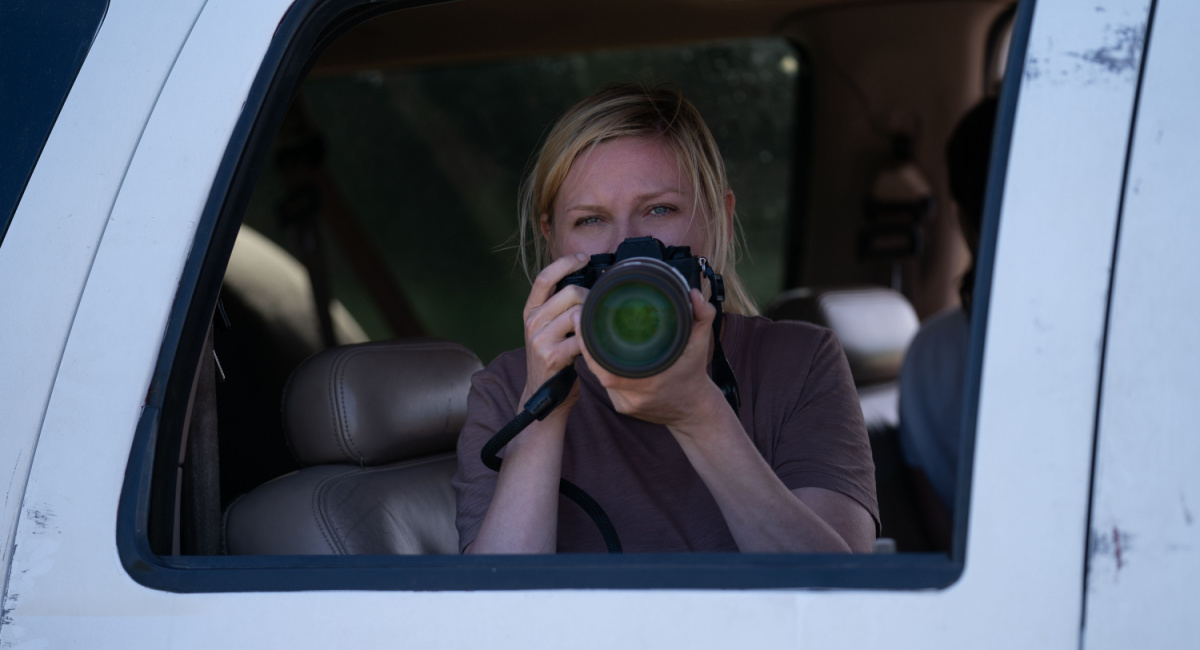
Kirsten Dunst in ‘Civil War.’ Photo: A24.
Other Alex Garland Movies:
Buy Tickets: ‘Civil War’ Movie Showtimes
Buy Alex Garland Movies on Amazon
Read the original article here



